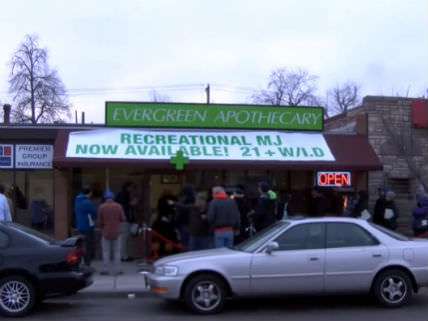Why Colorado's 'Cannabis Credit Co-Ops' Won't Solve the Marijuana Banking Problem

Yesterday the Colorado legislature approved a bill aimed at giving state-licensed marijuana businesses access to banking services by creating "cannabis credit co-ops." The summary of H.B. 1398 explains:
Because marijuana is illegal under federal law, financial institutions are reluctant to serve state-licensed marijuana businesses. These businesses therefore currently operate almost entirely on a cash-only basis, which raises their costs, increases the risk of crime, and impedes the state's ability to account for these businesses' revenues.
Although Gov. John Hickenlooper's office has indicated he will sign the bill, it will not actually solve the problem it purports to address. The cannabis credit co-ops cannot offer checking and credit card services without approval from the Federal Reserve, which is not likely to look kindly on financial institutions dedicated to serving businesses that federal law treats as criminal enterprises, especially since those organizations will not be covered by deposit insurance. "H.B. 1398 is likely not a solution to the banking problem, but an opportunity to move the conversation forward," says Mike Elliott, executive director of Colorado's Marijuana Industry Group. "It will allow cannabis credit co-ops to form, and seek permission from the Fed to access merchant services and checking. The Fed will likely not grant this access. Colorado is doing everything possible to solve this issue, and H.B. 1398 will give us a new opportunity to try to get approval by the Fed. The ultimate solution to banking lies with the United States Congress."
But what about those memos that the Justice Department and the Treasury Department's Financiancial Crimes Enforcement Network (FinCEN) issued in February? Weren't they supposed to "reassure banks that they won't be punished for doing business with legitimate marijuana shops in states that have legalized sales," as The Huffington Post puts it? As I explained at the time, what the memos actually did was highlight the legal and regulatory peril of daring to accept marijuana money. Here is how John Davis, who runs two medical marijuana dispensaries in Seattle, puts it: "The DOJ says, 'If you do this, you're violating this law, this law, and this law. And FinCEN says, 'On your filings, you are to admit to those crimes.' So the banks, very conservative institutions, are looking at this and saying, 'Nope. This doesn't give us any assurances. This says that we can be arrested.'" Don Childears, president of the Colorado Bankers Association, said "no bank can comply" with FinCEN's monitoring and reporting demands, which require financial institutions to "know and control their customers' activities, and those of their [customers'] customers." He summed up the memos' message this way: "Serve these customers at your own risk."
In light of all that, it was pretty funny last week when Republicans grilled Treasury Secretary Jack Lew during a congressional hearing about his supposed eagerness to accommodate federal felons. "The issuance of a green light for banking institutions to do business with these illegal marijuana shops and subsequent action by the Treasury Department to, in effect, rubber stamp that, gives me some pause," said Rep. Hal Rogers (R-Ky.), chairman of the appropriations subcommittee holding the hearing. "This is still an illegal product in practically every state….What about cocaine dealers? Shouldn't they be given the same break?" Lew explained that "our guidelines in no way change federal law"—which is why they have not had any noticeable impact on the availability of banking services to cannabusinesses.
As Childears observed, "an act of Congress is the only way to solve this problem." The Marijuana Businesses Access to Banking Act, introduced last summer by Reps. Ed Perlmutter (D-Colo.) and Denny Heck (D-Wash.), would protect banks that deal with state-legal marijuana businesses from criminal investigation or prosecution and from regulatory repercussions, including loss of federal deposit insurance.


Show Comments (18)